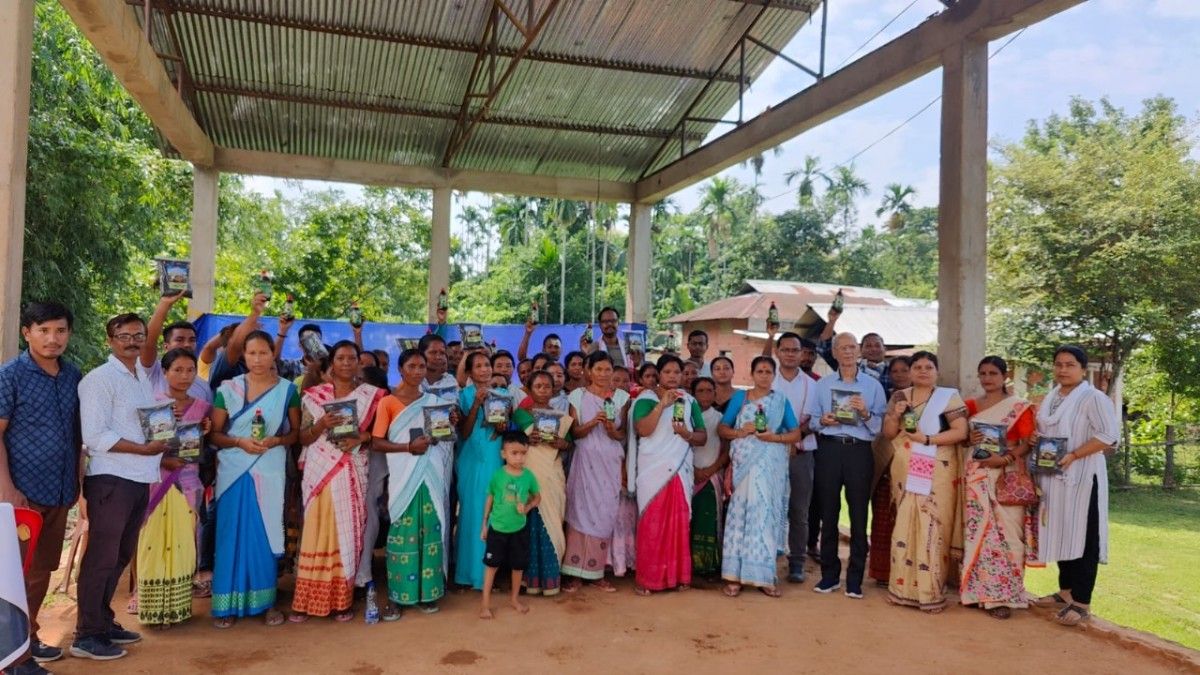Success Stories
Guwahati Gana Seva Samiti (GGSS) and Caritas India under the FARM Northeast program. The launch of two innovative organic products—Janata Bio-Pest Repellent and Janata Weed Compost—marks a new era of ecological farming, economic relief, and community empowerment.
The journey of this initiative began with the realization that conventional chemical inputs were not only straining farmers' finances but also degrading soil health. In response, GGSS mobilized smallholder farmer collectives to develop natural alternatives that could mitigate these challenges. After months of experimentation and knowledge-sharing, the Janata Bio-Pest Repellent and Janata Weed Compost emerged as viable solutions, offering both environmental and economic benefits.
The official launch event in Nizsohori village was more than a product unveiling—it was a celebration of grassroots innovation and resilience. Local farmers, government officials, and agricultural experts gathered to witness the impact of this initiative. Among the attendees was Apu Bordoloi, a smallholder farmer who shared his testimony on how the Janata Weed Compost had revitalized his soil and increased his crop yields. The reduction in chemical input costs, he noted, had significantly eased his financial burden, allowing him to reinvest in his farm.
Similarly, Mrinal Newar, another beneficiary, highlighted the efficacy of the Janata Bio-Pest Repellent. He praised its ability to control pest infestations without harming beneficial insects, fostering a balanced farm ecosystem. For Mrinal, this innovation was not just about pest control; it was about aligning his farming practices with nature and securing the long-term health of his land.
The presence of dignitaries such as Ms. Rekha Rani Chetia, Block Technology Manager, and Dr. D.N. Dutta, Former Dean of Assam Agricultural University, lent credibility and encouragement to the farmers' efforts. Ms. Chetia emphasized the scarcity of bio-pest repellents in the market and the importance of promoting such organic alternatives. Dr. Dutta elaborated on the ease of preparing these products at home, positioning them as entrepreneurial opportunities while cautioning against the harmful effects of chemical fertilizers and pesticides.
GGSS Director expressed optimism about the far-reaching impact of these products. He underscored the organization’s commitment to empowering smallholder farmers through innovative, cost-effective solutions. He assured that marketing strategies were being devised to ensure the products’ commercial viability, fostering an ecosystem where organic farming could thrive sustainably.
Caritas India’s Lead Technical expert, Mr. Prabal Sen, brought the discussion to a larger perspective, pointing out that reviving organic farming practices is not just about environmental stewardship but also about cultural preservation and climate resilience. He urged GGSS to create platforms where smallholders could sell their organic products, ensuring their economic sustainability.
As the initiative gains momentum, Mr. Prabin Minz, Field Programme Associate at GGSS, affirmed the organization’s dedication to promoting these eco-friendly products across Nagaon District. By equipping farmers with the tools and knowledge necessary for successful organic farming, GGSS and Caritas India are laying the foundation for a brighter, greener future.
This case story is a testament to the power of community-driven innovation. The launch of Janata Bio-Pest Repellent and Janata Weed Compost is not just a milestone; it is a beacon of hope, demonstrating that when farmers, organizations, and governments work together, sustainable agriculture can become a reality, ensuring food security, economic stability, and environmental harmony for generations to come.

